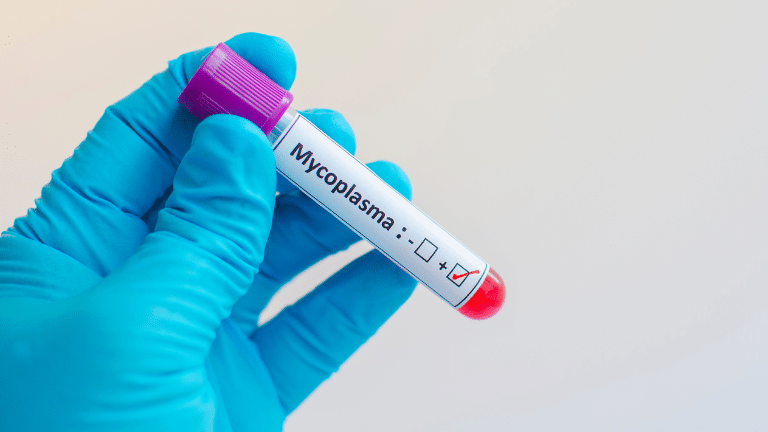
Professor Josh Davis, Director of the Infection Research Group, says that there has been a surge in mycoplasma cases in the past few weeks. So what is mycoplasma?
“NSW Public Health put out an advisory about mycoplasma a few weeks ago to doctors. This has resulted in a surge of people presenting to their doctors and Emergency Departments requesting testing and/or antibiotics (e.g. azithromycin) – which is often unnecessary,” says Professor Davis.
So what is mycoplasma?
Professor Nathan Bartlett, also from HMRI’s Infection Research Program, says, “Mycoplasma pneumoniae is a bacteria that causes lung infections which can lead to pneumonia.”
Professor Davis says that mycoplasma is a primitive kind of bacterium that, unlike most bacteria, lacks a cell wall. They can’t be seen down a microscope using normal stains (like Gram stain) and they are very hard to grow in the lab using usual agar plates.
This means that many common antibiotics that work by stopping cell wall production don’t work for mycoplasma. For example, none of the penicillin family of drugs work on this bacterium).
“There has been an increase in mycoplasma cases this year, but my understanding is nothing above the normal cyclical increases we see every few years believed to be related to waning community immunity. Of course, COVID has thrown everyone’s immunity out of whack so it’s not surprising that we are seeing these infections return,” says Professor Bartlett.
So what are the symptoms of a mycoplasma infection?
“Mycoplasma often causes a relatively mild illness, known in the textbooks as a ‘walking pneumonia’. It can cause more severe disease but the usual symptoms are a dry cough and a headache. Mild cases in children usually resolve without antibiotic treatment,” says Professor Davis.
If you do contract mycoplasma, Professor Bartlett says that you should stay home while you’re symptomatic and minimise contact
“Mild infections can be managed at home without treatment. It can become severe in school aged kids and eldery adults and lead to pneumonia – which of course does require hospital admission and treatment with antibiotics because remember this is a bacteria, not a virus, so certain antibiotics are effective,” says Professor Bartlett.
Professor Davis explains that up until the past few years, Mycoplasma was diagnosed using blood tests that didn’t become positive until weeks after recovery. Now, many laboratories offer a ‘multiplex PCR’ that tests for mycoplasma in addition to other common causes of respiratory illness such as influenza and COVID.
“This change in testing technology is likely one of the main reasons that we are seeing more mycoplasma diagnoses in recent years,” he says.